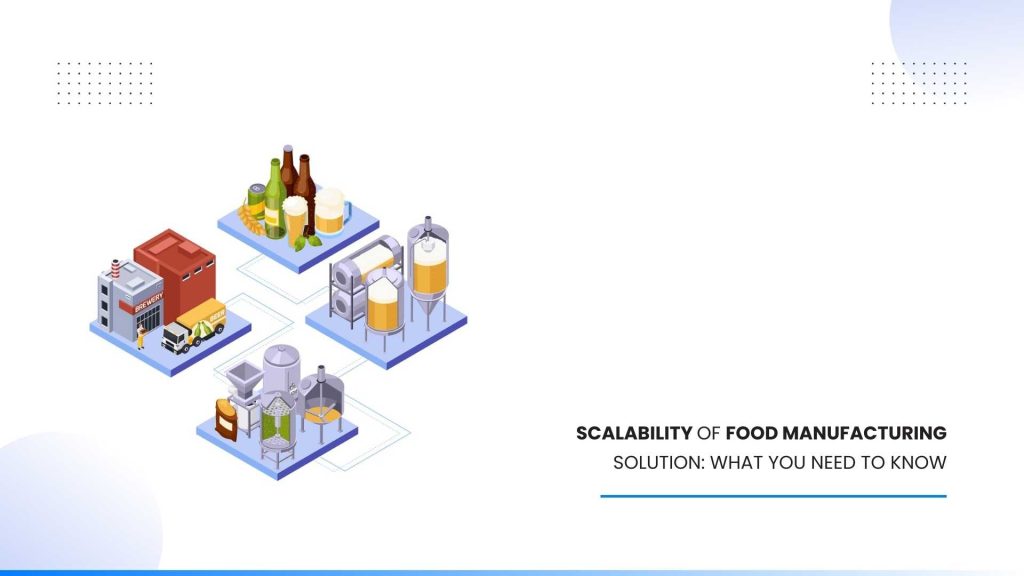Food manufacturing is competitive, requiring agility and efficiency to meet consumer demands. Scalability is crucial for success as the industry grows. Companies use food manufacturing software for innovation. This article delves into scalability in food manufacturing.
Understanding Scalability in Food Manufacturing Software
Scalability in food manufacturing software is crucial for companies to expand operations, increase production capacity, and efficiently meet market demands. It also allows for optimized resource management and increased productivity.
Significance of Scalability in Food Manufacturing
Food manufacturers face increased processing costs, supply chain disruptions, labor shortages, and evolving consumer preferences. To achieve sustainable growth, they require scalable software solutions:
Increased Production Efficiency:
Scalable software solutions help manufacturers boost efficiency, reduce waste, and optimize operations by automating tasks and handling large data volumes.
Improved Resource Management:
Scalable software improves resource management for manufacturers by optimizing inventory, production tracking, and scheduling to maximize raw material, equipment, and labor efficiency.
Enhanced Quality Control:
Scalable software solutions help manufacturers uphold quality standards during production scaling by enabling automated quality control processes and real-time monitoring to identify and resolve issues proactively.
Better Supply Chain Management:
Manufacturers use scalable software solutions to manage complex supply chains, including inventory, procurement, and logistics, ensuring timely deliveries and enhancing customer satisfaction.
Increased Flexibility and Adaptability:
Scalable software enables manufacturers to adapt to market changes and consumer demands by swiftly adjusting production schedules and recipes and introducing new products. This helps them stay competitive and capitalize on growth opportunities.
How ERP Solution Takes Food Manufacturing to the Next Level
Streamlined Production Planning and Management
ERP software benefits food manufacturers by streamlining production planning, managing schedules, optimizing workflows, and improving resource allocation for enhanced productivity and reduced waste.
ERP systems for food manufacturers include recipe management, batch tracking, and production scheduling tools to maintain product quality consistency, track ingredients and batches, and ensure on-time delivery.
Recipe and Formulation Management
Effective recipe and formulation management is essential in food manufacturing to uphold product consistency, comply with regulations, and satisfy customer demands. Cloud ERP offers powerful features for efficiently handling recipes, formulations, and bills of materials (BOM).
ERP software for food manufacturers offers recipe management to maintain precise formulas, track ingredient specifications, and calculate costs. It allows analysis and adjustment of recipes based on ingredient availability, pricing changes, or customer preferences, enabling quick responses to market demands while ensuring product quality.
Compliance with Food Safety and Regulatory Standards
Food manufacturers use ERP software to comply with food safety standards, track information like lot numbers and quality test results, and ensure traceability in the supply chain for quick issue resolution.
Business Intelligence and Analytics
ERP systems for food manufacturers offer business intelligence tools for data analysis. They provide customizable dashboards, reports, and KPIs to monitor and improve manufacturing processes.
Manufacturers use real-time data and ERP analytics to improve operational efficiency by identifying trends, reducing waste, optimizing production schedules, and enhancing overall business performance.
Conclusion:
Acumatica Cloud ERP offers food manufacturers a customized solution to enhance operations. It includes production planning, inventory management, supply chain integration, financial management, and business intelligence. Our ERP system helps improve efficiency, cut costs, ensure quality, and stimulate growth in the food industry.
Read Related Blog: Effective Data Management For Food Manufacturing

Sangeetha brings 20 years of experience in Information Technology which includes Solution architecting, building micro services, research, and evaluation of business applications, integrating apps.

